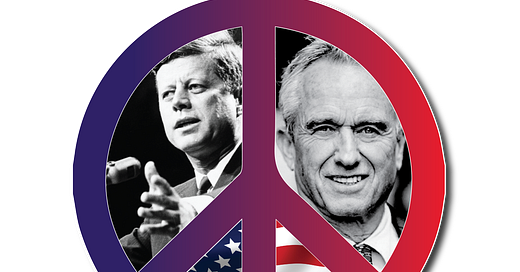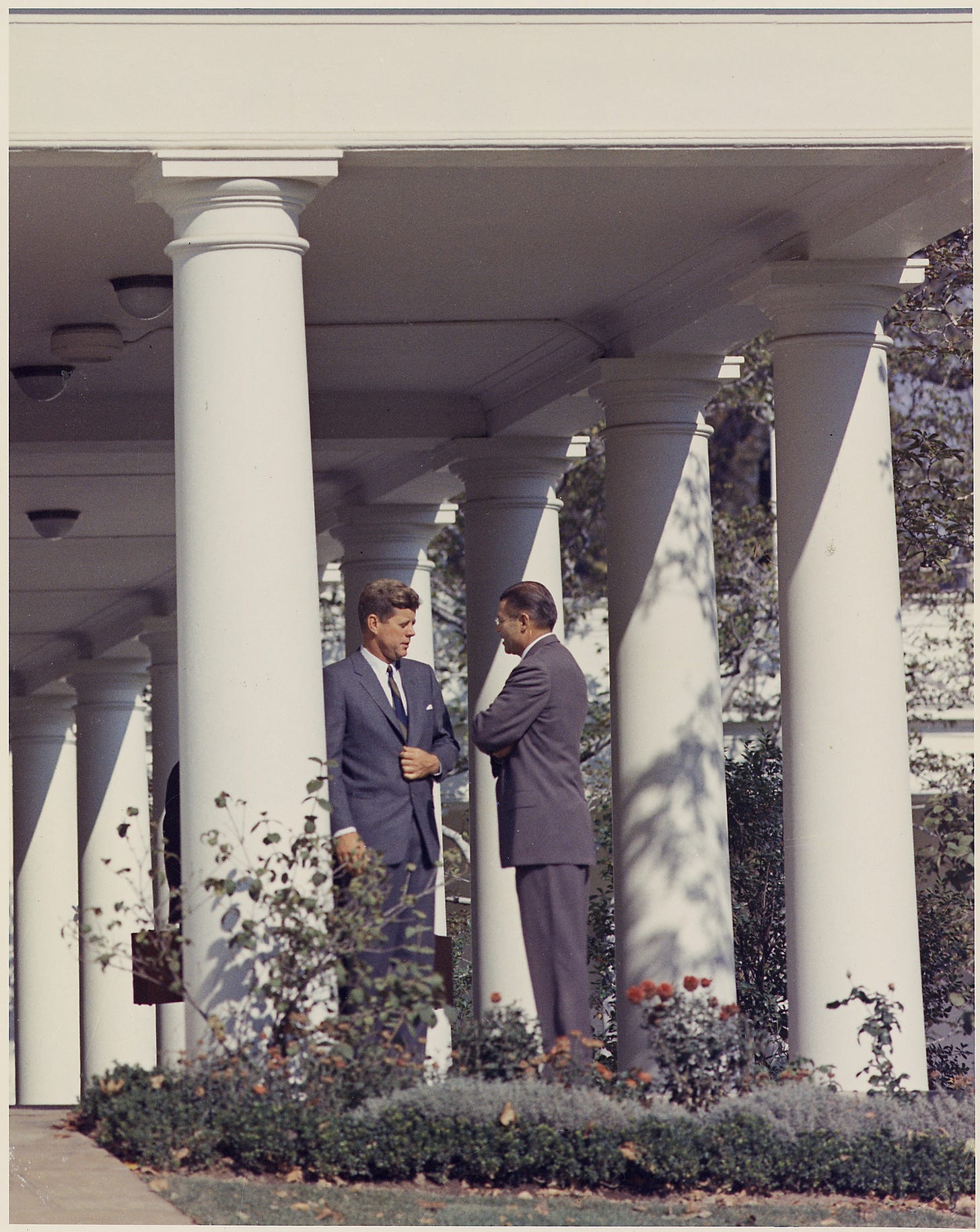The World in Crisis: Why We Need Kennedy’s New American Foreign Policy
By Aaron Good, Columnist, The Kennedy Beacon
“Officials tell us that inside the White House, this was the heaviest, most chilling week since President Biden took office just over 1,000 days ago.”
So write Axios CEO Jim VandeHei and cofounder Mike Allen about the unprecedented crises that US leaders are currently facing. “Never before,” they state, “have we talked to so many top government officials who, in private, are so worried about so many overseas conflicts at once.” The authors tell us that they “don’t like to sound dire.” Rather, they just want “to sound a siren of clinical, clear-eyed realism.”
Among 2024 presidential contenders, only Robert F. Kennedy Jr. is sensibly diagnosing these crises. Getting to the heart of the matter, the Kennedy campaign website states,“It is time to end the imperial project and attend to all that has been neglected: the crumbling cities, the antiquated railways, the failing water systems, the decaying infrastructure, the ailing economy.”
Kennedy also stands alone in calling for a revolutionary change in US foreign policy: “As President, Robert F. Kennedy, Jr. will start the process of unwinding empire,” the Kennedy 2024 website writes. More specifically, Kennedy vows that “We will bring the troops home . . . . We will end the proxy wars, bombing campaigns, covert operations, coups, paramilitaries, and everything else that has become so normal most people don’t know it’s happening.”
There is much in Kennedy’s family history to affirm that he is sincere about taking on these monumental challenges. As the Kennedy 2024 website explains, “Kennedy will revive a lost thread of American foreign policy thinking, the one championed by his uncle, John F. Kennedy who, over his 1000 days in office, had become a firm anti-imperialist.”
Around the world, we see the US embroiled in avoidable crises which have clear antecedents in the time of President John F. Kennedy. Take Ukraine, for example. The Kennedy 2024 website states, “[T]he most important priority is to end the suffering of the Ukrainian people, victims of a brutal Russian invasion, and also victims of American geopolitical machinations going back at least to 2014. [Kennedy] will find a diplomatic solution that brings peace to Ukraine and brings our resources back where they belong.”
A situation like Ukraine would not have arisen if the US had not removed John F. Kennedy and leaders like him from power. Robert Kennedy Jr. has repeatedly stated in interviews that his uncle, President Kennedy, understood that nuclear powers needed, above all, to avoid situations that could spiral into nuclear war. US leaders need to be able to understand the position of the people on the other side so as not to force adversaries into a situation where the choice is between a humiliating defeat and nuclear war.
In 1961, JFK and Khrushchev resolved the Berlin Crisis. Kennedy was able to restrain bellicose generals like Lucius Clay, who nearly started World War III. Khrushchev dealt with the communist side’s brain drain crisis by erecting the Berlin Wall. Said President Kennedy, “It’s not a very nice solution, but a wall is a hell of a lot better than a war.”
Robert L. Knudsen, Public domain, via Wikimedia Commons
In the case of Ukraine, US policy makers did not merely forget that their actions in Ukraine would harm Russian security. The chance to damage Russian security was precisely the motivation behind America’s Ukraine policy!
During the Cuban Missile Crisis, Khrushchev and Castro recklessly placed nuclear missiles in Cuba. Even under JFK’s comparatively enlightened leadership, the US would not stand for this move—whether or not it was legal under international law. But even here, the difference is notable. The Soviet moves were undertaken to deter any illegal US invasion of Cuba—a country whose people ousted a puppet regime through an authentic revolution. In Ukraine, the regime which Russia is fighting was installed by a bloody coup that, as Consortium News contends, the US illegally backed and which overthrew a democratically elected government.
Thankfully, in October of 1962, JFK was able to reach a peaceful compromise with the Soviets. Nuclear war was avoided. In contrast, in the Ukrainian case, the US acted decisively very early in the war to make sure that Zelensky did not negotiate a peace deal which would have saved Ukraine from losing hundreds of thousands of lives in a war that it cannot win.
Taiwan is another flashpoint that traces back to the Cold War. By 1949, the Chinese nationalist government had become a fully Western-backed construct. Despite the Chinese Communist Party receiving no commensurate external support, they were able to rout the corrupt nationalists, forcing them to flee to the Chinese island of Taiwan. Washington, Beijing, and Taipei all agree that Taiwan is part of China. Since time and international law are on its side, the Chinese government has not sought to heighten tensions over its wayward province. Similarly, the Taiwanese people don’t want their island to be the next Ukraine. Furthermore, the world certainly does not want the island to spark nuclear doomsday. Here again, the US must reverse course and play a constructive role in solving rather than exacerbating and exploiting crises. Alone among presidential contenders, Robert F. Kennedy Jr. recognizes the need to avoid a disastrous military conflict with China. In a recent tweet, he explained:
The indications are that the Chinese leadership does not want a military confrontation with us, and we shouldn’t want that either. America should compete with China on an economic plane, however. It would be good for the Chinese, good for Americans, and good for the rest of the world.
In Haiti, the US seems to have orchestrated a modest intervention using Kenya as a front of sorts. The US has been brutal toward Haiti ever since the country liberated itself from French slavery in the early 1800s. Both Presidents Bush—senior and junior—oversaw separate US coups which overthrew the elected Haitian president, Jean Bertrand Aristide. Under JFK, the US attempted to pursue democratic reforms in Latin America, including in the Caribbean. JFK opposed despotic leaders like Duvalier in Haiti and Rafeal Trujillo in the Dominican Republic. Kennedy favored the democratic Dominican reformer, Juan Bosch. After Kennedy was assassinated, the US lurched back into supporting military dictatorships in places like Brazil and the Dominican Republic. It is far past time for the US to return to a Kennedy policy of constructive engagement through the whole of Latin America.
National Archives and Records Administration, Public domain, via Wikimedia Commons
In Israel-Palestine, too, there is much to be learned from studying JFK’s foreign policy. Here again, President Kennedy put enormous energy into balancing the interests of the US and its Western allies with the legitimate aspirations of the developing world. In letters to Arab leaders, President Kennedy had committed himself to supporting UN Resolution 194. Written in 1948, the resolution contained an article stating that the UN
…[r]esolves that the refugees wishing to return to their homes and live at peace with their neighbors should be permitted to do so at the earliest practicable date, and that compensation should be paid for the property of those choosing not to return and for loss of or damage to property which, under principles of international law or in equity, should be made good by the governments or authorities responsible.
A White House memo reveals Kennedy’s thoughts on the issue when the plan failed:
[T]here has been no practical progress on the refugee question. […] Israel is saying, for all practical purposes, it will not accept any refugees and that no progress can be made on this question in the immediate future. We cannot accept this. The president is concerned—in fact he is dissatisfied—that Israel has not been more forthcoming. We cannot and will not accept the status quo on this matter. We want and expect Israeli cooperation on the basis of the formula discussed by the president and Ben-Gurion in 1961; some repatriation and plenty of resettlement.
President Kennedy was also dead set against nuclear proliferation in the Middle East. As president, he insisted on having Israel’s Dimona nuclear site inspected to ensure that the Israelis were not developing the bomb. In a letter to Israeli prime minister David Ben Gurion, Kennedy wrote, “[T]here is no more urgent business for the whole world than the control of nuclear weapons. […] Development of a nuclear weapons capability by Israel would almost certainly lead other countries that have so far refrained from such development to feel that they must follow suit.”
After Ben Gurion did not respond favorably, Kennedy sent a letter which included a near-ultimatum for Israel: “This government’s commitment to and support of Israel could be seriously jeopardized if it should be thought that we are unable to obtain reliable information on a subject as vital to peace as the question of the character of Israel’s effort in the nuclear field.” Apparently, Ben Gurion chose to resign rather than accept receipt of the letter. The Kennedy administration’s difficulties were summed up effectively by a State Department communication with Israel: “Couldn’t the Israeli government acknowledge just once that the US had a defensible position in attempting to maintain good relations with the Arab states?”
As with many other areas of foreign policy, President Johnson dramatically reversed Kennedy’s Israel policies. The US abandoned Kennedy’s efforts to both solve the Palestinian crisis and stop Israel from acquiring the bomb. The failure to address the Palestinians’ plight has led to endless cycles of violence with no peaceful and just solution in sight.
Now, in the fall of 2023, as Israel opts for a maximalist military response, global opinion will likely turn decisively and perhaps irreversibly against the US and Israel. This is not the worst of it. Other countries could intervene to defend the stateless Palestinians against the Israeli military. This could spiral into a regional conflict with the potential to go nuclear.
Around the globe, the world order built by the US is crumbling. With overwhelming wealth and power, the US after World War II succumbed to imperial hubris. Much of the world’s current turmoil has resulted from fateful choices made at key junctures by powerful US actors. There is no going back to 1945. History offers no do-overs. By assassinating JFK, the apex of the US Empire essentially vetoed President Kennedy’s efforts to restrain American global dominance. We can see the results all around us.
Meanwhile, Washington is utterly rudderless. Perhaps no one better personifies imperial decrepitude and mindlessness than Senate Minority Leader Mitch McConnell. In a recent interview, the senator told reporters, “The Iranians are a threat to us… It's an emergency that we step up and deal with this axis of evil—China, Russia, Iran—because it's an immediate threat to the United States. In many ways, the world is more endangered today than it has been in my lifetime.”
The “danger” McConnell refers to is that the US will no longer be the global sovereign. For people like the senator, America has the divine right to dictate the terms of the “rules-based international order” to the world. Leaders like McConnell have learned nothing from the disastrous wars which the US launched after 9/11 and the so-called “Arab Spring.” These people are like drunken gamblers, hoping that their last dollar can reverse their fortunes.
For the good of people in the US and around the world, we need a new American foreign policy. President Kennedy’s approach is the best template we have. As such, Robert F. Kennedy Jr. should have the last word here:
We have neglected the foundation of our own well-being. We have a decaying economic infrastructure. We have [demoralized,] despairing people. We have toxins in our air and our soil and our water. We have deteriorating mental and physical health. These are the wages of War. [...] What will be the wages of Peace? It will be healing of all the symptoms of America’s decline. None of these are beyond our capacity to heal. We can restore America to the awesome vitality of the original Kennedy era.









This is all well and good, but when will we be hearing RFK Jr himself call for a comprehensive negotiated peace settlement in the Middle East? Netanyahu is making apocalyptic rants, the US is on hair-trigger alert against their imagined "axis of evil." We need a presidential peacemaker NOW.
Persuasive, with history I did not know about JFK in the early years of Israel, his humane and smart views on the Palestinians. I hope Bobby evolves on the appalling events we're seeing every day in Gaza and the West Bank.